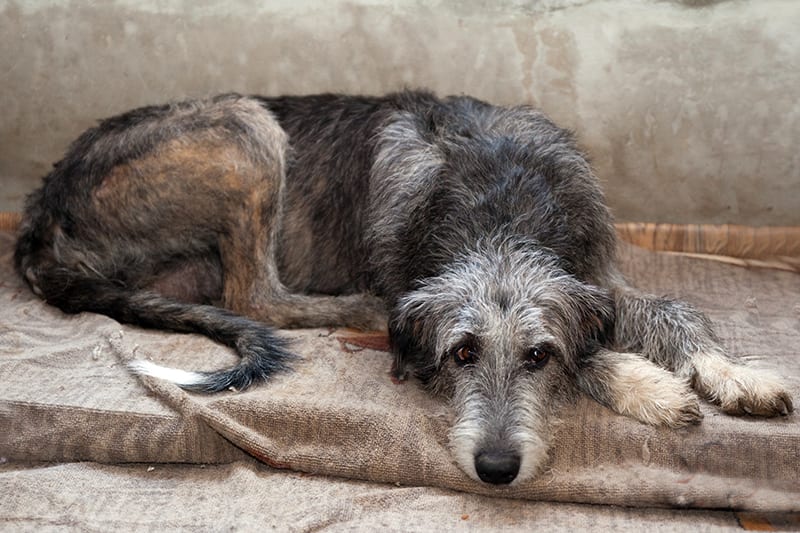It's not uncommon for our canine companions to experience anxiety and depression from time to time. Below are a few tips from our Bartlett vets that may help to alleviate your dog's anxiety or depression.
Is my dog depressed or anxious?
If your dog's nerves seem to be on edge, or if your pup is exhibiting behaviors that lead you to believe they may be anxious or depressed it's time to take action.
Below are some common signs of anxiety and depression in dogs. If your dog is exhibiting three or more of the following signs, a trip to your vet can help to pinpoint whether your pup's symptoms are caused by depression, anxiety, or something else:
Look for These Common Signs of Dog Depression
- Disinterest in playing with people or toys
- "Sad" expression
- Lack of energy
- Avoiding you or hiding
- Growling, howling or aggression
- Sleeping too much
- Decreased appetite
- Not sleeping
Signs of Dog Anxiety to Watch For
- Destructive chewing or destroying furniture
- Obsessive paw licking
- Spontaneous bowel movement or urination
- Panting for no reason
- Pacing aimlessly
- Whimpering, trembling, or whining
Why Dogs Become Anxious or Depressed
A routine lifestyle with reliable schedules helps to make dogs feel more relaxed, which means that any major life changes or distressing events can have a huge impact on their emotional state.
While obviously emotional events such as their owner’s death or prolonged absence can bring on symptoms of anxiety or depression in dogs, other less extreme events such as a move to a new home, injury or illness, change in routine, or even a new pet or person in the home could be the cause of your pup's case of the blues.
Helping Your Dog to Feel Happier & More Contented
Anxious or depressed dogs benefit from predictable routines and environments, closely monitored social interaction, and lots of physical activity. Below are a few more tips on how to help reduce your dog's depression:
Have Your Dog Examined by Your Vet
Symptoms linked to depression and anxiety can actually have physical causes that need urgent veterinary attention. The first thing you should do if your dog doesn't seem happy is to schedule a visit with your vet.
Although dogs will often recover from depression with just a little extra love and attention from their pet parent, your veterinarian can provide medications such as antidepressants or anti-anxiety aids to help calm their nerves if things don’t show signs of improvement.
Keep Your Dog's Mind & Body Busy
Bored pets often get into mischief, and become anxious or depressed. Make sure your pooch gets plenty of exercise before you leave the house for the day, and supply your pup with enough toys to keep them busy and help curb dog anxiety. Look for toys that are interactive or can be stuffed with treats to keep your dog's body and mind active while you're out of the house.
Give Your Pup Plenty of Social Time
It's important for pet parents to remember that our canine companions are social creatures that love to be around people and other animals. If your dog seems lonely and sad try taking your pooch to the dog park, group classes or doggie daycare for additional social interaction. You may even want to consider getting a companion animal for your dog.
Show Lots of Love & Patience
Dogs need lots of love and patience to feel safe and contented - even more so if they are feeling depressed or anxious. By giving your pup a little extra time and attention you may be able to alleviate these issues.
Note: The advice provided in this post is intended for informational purposes and does not constitute medical advice regarding pets. For an accurate diagnosis of your pet's condition, please make an appointment with your vet.
Do you think that your dog may be feeling depressed or anxious? Contact our Bartlett vets today to book an examination for your four-legged friend.

Looking for a vet in Memphis?
We're always accepting new patients, so contact our veterinary hospital today to book your pet's first appointment.Related Articles View All
Heimlich Maneuver For Dogs: What To Do If My Dog Is Choking
What should you do if something gets lodged in your dog's throat and they begin to choke? Here, you will find helpful information on the Heimlich maneuver for dogs and what to do if your dog is choking.
Signs That Your Dog May Have a Cavity
Can dogs get cavities? What are the signs of cavities in dogs? In today's post, you will find the answers to these dog cavity questions and more.
How can I help my dog with allergic dermatitis feel better?
Our Bartlett vets often see dogs with skin issues caused by allergens. In today's post, we discuss the different causes of allergic dermatitis, signs of dog skin allergies, and how this condition can be treated.
Periodontal Disease in Dogs - Symptoms & How It's Treated
Healthy teeth and gums play an important role in your dog's overall health, but many dogs don't receive the dental care they need to prevent oral health problems from arising. Our Bartlett vets explain.
